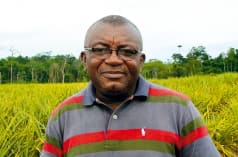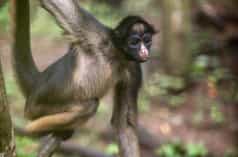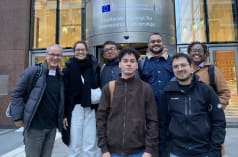The Sustainability Lie – A film about the dirty palm oil business
Rainforest Rescue / Rettet den Regenwald e.V.
Press Release
for immediate release
The Sustainability Lie – A film about the dirty palm oil business
Hamburg, 10th November 2010 – From 8th to 11th November, the Roundtable on Sustainable Palm Oil (RSPO) is holding its Annual General Assembly in the Indonesian capital Jakarta. Europe wants to import ever more cheap palm oil and RSPO-certificates are buying producers and customers a good conscience. However, sustainable palm oil production is a myth, not a reality. Today, the NGO Rainforest Rescue is releasing a film about deforestation and evictions in Indonesia at the hands of the world's largest palm oil company.
Nordin, founder and director of the human rights organisation Save our Borneo states: „The Wilmar corporation are destroying tropical rainforests. They are stealing our land, polluting our rivers and lakes with pesticides and toxic residues from their palm oil mills. They are breaching Indonesian law by cutting forests without licence or environmental permits.“ Nordin is standing on devastated land which was coverted in tropical rainforest just a few weeks ago. His anger is aimed at Wilmar International Ltd, a multinational investment holding with investors from Indonesia, Malaysia and the US, registered in Singapore.
Global Film and Rainforest Rescue visited Borneo and Sumatra in September 2010 in order to document Wilmar's crimes against people and nature. The result is a 12-minute long film documentary: “The Sustainabilty: Lie – How the palm oil industry is deceiving the world”. Nordin says: “Despite certificates, the companies, and first and foremost the Wilmar corporation, are considering to cut down forest illegally. In Central Kalimantan alone, Wilmar has obtained concessions for 300,000 hectares of oil palm plantations on rainforest land.
In August this year, TUV Rheinland granted an RSPO certificate to Wilmar's subsidiary PT Mustike Sembuluh, in respect of 15,000 hectares of plantations and a palm oil mill. Wilmar continues to dump polluted and stinking discharges into rivers and Lake Sembuluh, on which 7,500 people depend.
The RSPO is dominated by the palm oil industry, traders and bank. Of 386 RSPO members, 95% represent industry interests, with environmental and social organisations accounting for a mere 5%. Multinational Unilever provides the RSPO President, Wilmar International and WWF the Vice Presidents (1). Unilever is the largest palm oil purchaser worldwide, using 1.6 million tonnes a year. Wilmar International, the world's largest palm oil company, is their main supplier.
„The RSPO industry certificate, devised by palm oil producers, traders and WWF in 2004 is based on lies“, says Klaus Schenck, Forest and Energy Campaign Spokesperson with Rainforest Rescue. "The lies about 'sustainable' palm oil must be ended immediately and European imports must be stopped. We must not consume any more palm oil at the expense of rainforests and the people living in rainforest areas".
„While grand speeches are being made at the RSPO Conference in Jakarta, bulldozers are continuing to illegally cut down rainforests and destroy the livelihood of people“, confirms Nordin.
In Sumatra, the film crew witnessed similar scenes. In Jambi province, Wilmar has turned a large rainforest area which legally belongs to indigenous Orang Rimba people into an oil palm plantation. Private security forces, hired by the company, control and bully people who live in huts at edges of the plantation. Wilmar has had 16 small farmers thrown into prison because they allegedly stole palm nuts – on their on land.
The World Bank has been an important financier of the palm oil industry. Over forty years, they subsidised the industry to the tune of $2 billion in total. Wilmar alone received $146 million. Over the past year, complaints by Indoensian farmers against Wilmar International forced World Bank Zoellick to suspend all payments for palm oil. Just one year on, however, the World Bank is preparing to re-enter the palm oil business. Their new draft palm oil strategy relies heavily on RSPO-certified palm oil, falsely described as 'sustainable'. "The World Bank must end palm oil finance once and for all", says Schenck.
The joint documentary by Global Film and Rainforest Resuce can be viewed below and at www.youtube.com/watch?v=1NAYWHb-xaU
Contacts:
Rainforest Rescue/Rettet den Regenwald e.V.Christiane Zander, +49-40-420 87 49, christiane.zander@regenwald.orgKlaus Schenck, +34-981 826 119, berlin@regenwald.orgJupiterweg 15, 22391 Hamburg, GermanyTel. +49-40–410 38 04, Fax:+49-40–450 01 44info@regenwald.org , www.rainforest-rescue.org
1.) Jan Kees Vis, Director of Uniliver's “Sustainable Agriculture Programme”, Adam Harrison, responsible for WWF's Food and Agriculture Programme, Jeremy Goon, Wilmar Director for Corporate Social Responsibility










